How Much Fun Was PyData NYC 2022?
Hi everyone! It's been a few weeks since I’ve written a blog post, but I have to share the events that were the highlight of last week: PyData NYC 2022.
I want to start off by thanking the amazing volunteers who put together the conference—from others on the organizing committee to the in-person volunteers who assisted with sprints, registration, talks, tutorials, and much more. Thank you for all of your time and help! It made for a true sense of community.
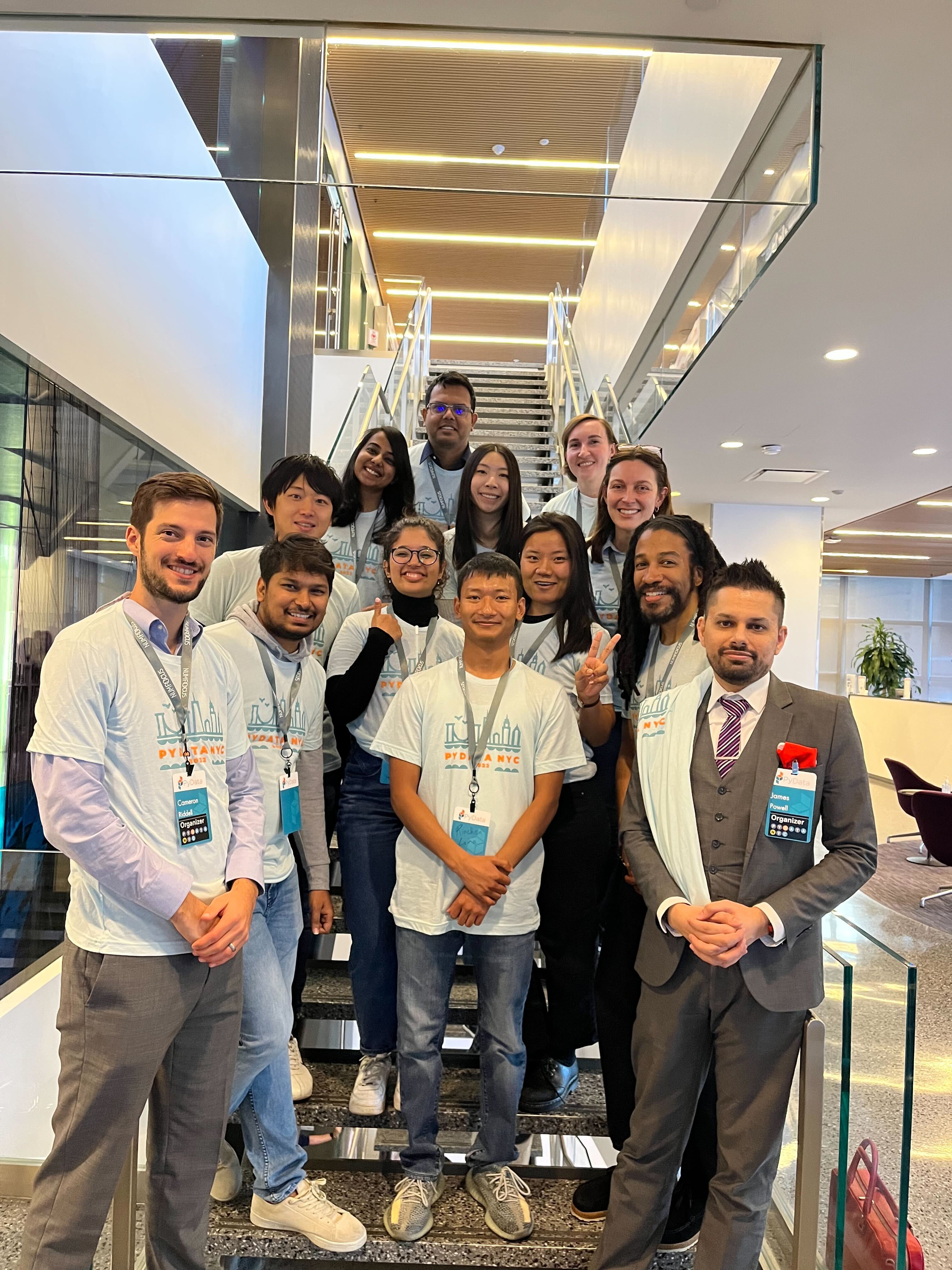
How Was I Involved?
As some of you may know, I served on the organizing committee for PyData NYC 2022. But what you may not know is that this was my first in-person Python conference ever! I am very grateful for the rest of the committee members who provided me with guidance and support throughout the event. The organizing committee began preparing a few months in advance, ensuring we had a venue and contacting sponsors. Then, things really started picking up for me when we opened our call for proposals. I was able to sit in on the proposal committee to observe the review process. I also worked with James to organize our fantastic keynote speaker line-up, who also deserve a round of thanks:
Chelle Gentemann (NASA)
Thomas Caswell (BNL, Matplotlib)
Paul Romer (NYU)
Melissa Mendonça (Quansight, NumPy/SciPy/pandas/Matplotlib)
Our keynotes were absolutely amazing. I truly enjoyed each of their talks, as well as the opportunity to interact with them during our fireside chats.
In addition to organizing our keynotes, I also helped organize our pre-conference sprints, which included some fantastic Open Source projects:
I had the opportunity to work with core developers & maintainers from each of these projects, and we had a truly successful sprint. But I don’t want to go too deep into how I contributed to the conference; I want to share with you more about the whole experience!
Overall, How Was the Conference?
The conference was amazing (and no, I’m not just saying that). I traveled across the US to attend in-person, and it was worth every hour on the plane. From the first keynotes speaker on our first day, to the final tutorial on our last day, the conference was a success.
The PyData community is friendly and fun. I spoke with many people passionate about their work. More importantly, it was a judgment-free zone. No one was there to declare they knew Python the best or that they were better developers than another. Everyone was there to share their knowledge and projects, ask and answer questions, and just support one another. You could truly network with anyone just by walking up to them and introducing yourself. PyData has truly created a community I am proud to become a part of.
But What Was the Day-to-day Like?
Day 0: Sprints (Tuesday, Nov 8th)
Why start at day 0? Well it’s not a Python joke—the sprints were actually held as a free-to-attend, pre-conference event! We had ~40 new (and seasoned) contributors at our sprints working on our various projects. The sprints were incredibly fun, and many opened their first PRs for our projects, helping out with both documentation and implementation!
I also got my first 2 Python stickers from our matplotlib maintainer Hannah Aizenman!
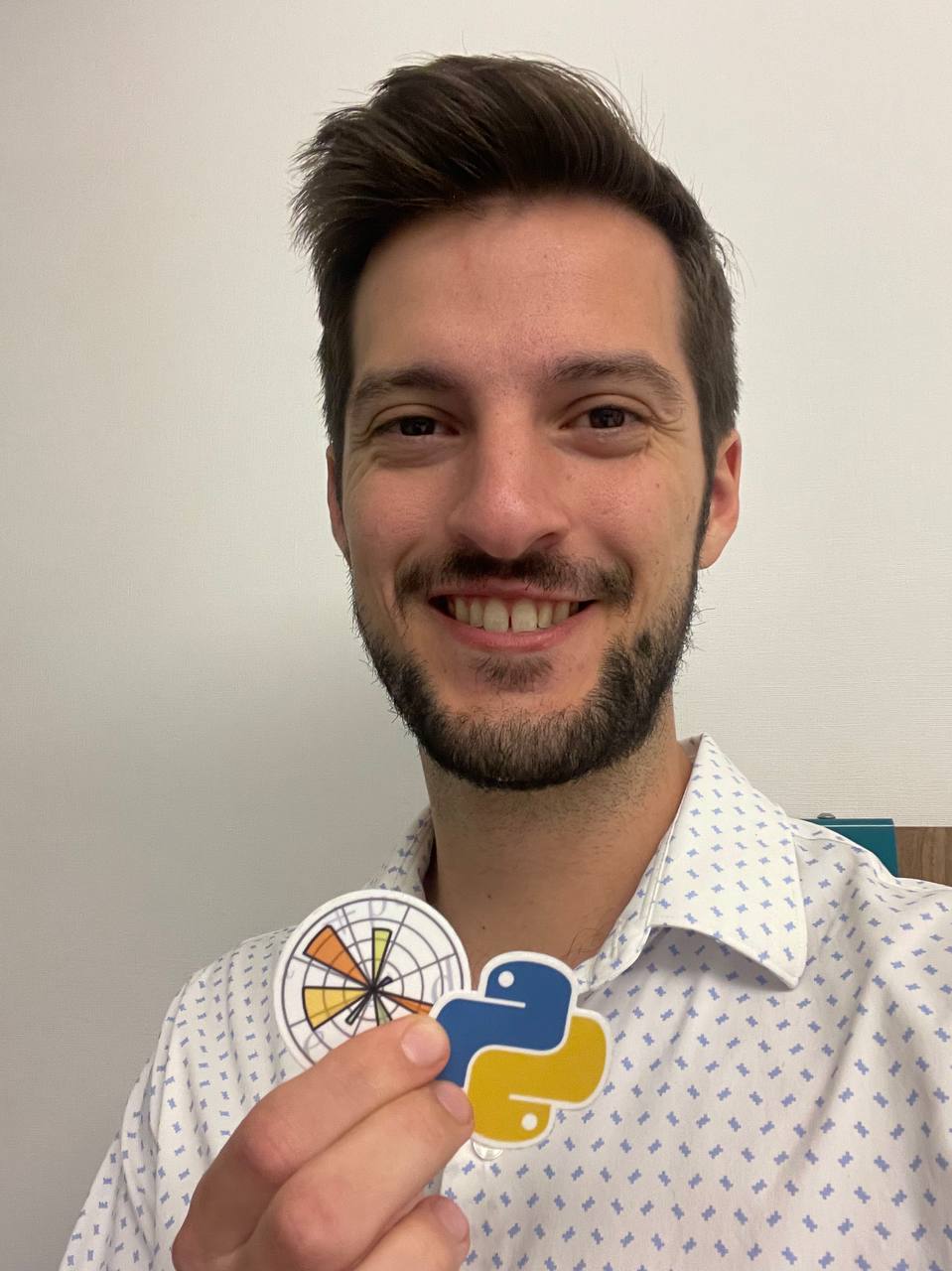
The sprints would not have been such a great success if it weren’t for our developers, maintainers, and leads representing various projects from the PyData community. I want to take a moment to thank...
Ganesh Kathiresan NumPy
Juan Luis Cano Rodríguez SciPy
Hannah Aizenman Matplotlib
Christian Luhmann PyMC
Marius van Niekerk conda-forge
Their support for our sprinters helped them get these projects built from source and guiding them through the contribution process.
Thanks to the sprint, we had 6PRs opened, and everyone made many new friends. If you haven’t been to a sprint or contributed to open source before and want to get started, I would highly encourage you to get in touch with the developers I listed above! Contributing to open source should not feel scary, and these individuals are more than happy to help point you in the right direction and get you started contributing back to the projects you love and use every day.
Day 1: Talks (Wednesday, Nov 9th)
Day 1 of the conference! We had our opening remarks from James Powell and Lauren Oldja, followed by our first keynote with Chelle Gentemann from NASA, entitled “I’m from the government and I’m here to help.” Chelle’s talk was a great call-to-action for everyone to participate in Open Science. NASA is working to train and incentivize scientists on this important endeavor and acknowledge the important role that Open Source plays as a part of the Open Science effort.
We then broke out into a myriad of talks for the rest of the morning session, from which I won’t pick favorites or go too deeply into... except for James' talk of course! James gave a talk titled “Why do I need to know Python? I'm a pandas user…” where he shared his thoughts on how we can all start incoporating more fundamental Python concepts into our analysis code. Sets, generators, pathlib, lists, and much more all have a place in our analyses and we should remember that just knowing one tool will often lead to hyper-specific solutions.
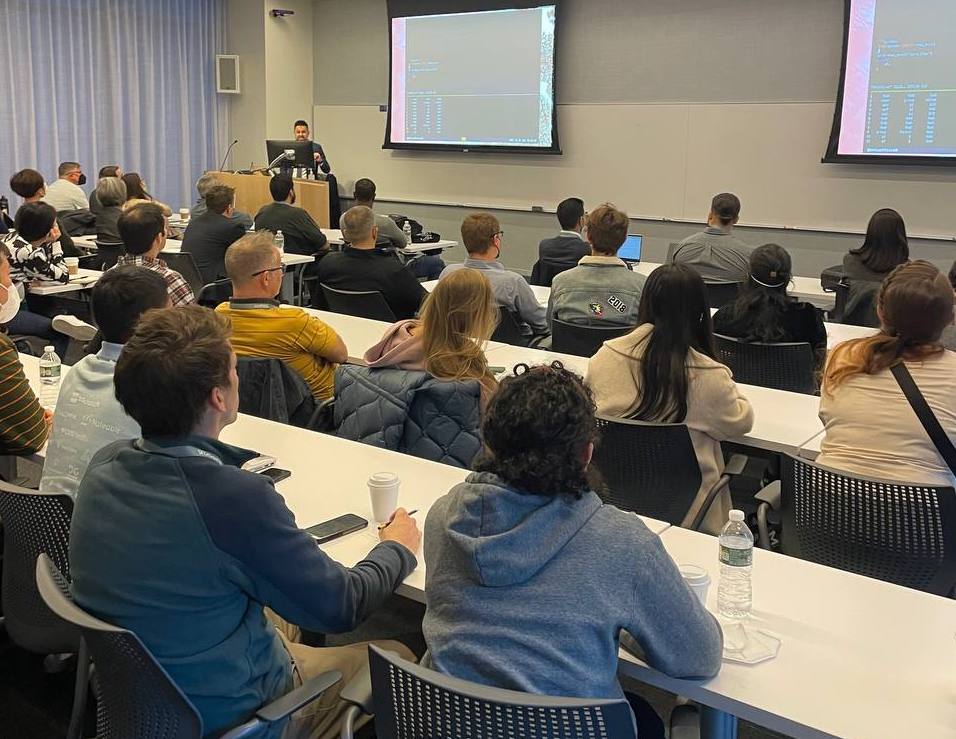
After James talk we immediately headed into our keynote speaker's address for the afternoon: Thomas Caswell's “From Science to Open Source and Back Again.” Thomas gave a brilliant talk highlighting the interplay between academics and software development. This talk really resonated with me as I have had a similar career path, and I was excited to learn how many members of the PyData community started off pursuing higher education on some topic completely unrelated to software development.
We wrapped up the first day with our Social, hosted by CVS Health, where I was able to chat with many of the other conference-goers about how they use Python in their work and what they were hoping to get from the conference. After networking, we wrapped up the evening with the Pub Quiz hosted by James Powell and myself. I spoke with many others who said they had an absolute blast with the Pub Quiz as did James and I. We interweaved serious Python questions with fun ones along with some questions to help you get to know our NumFocus staff and project developers/maintainers. If you attend a PyData event in the future, the Pub Quiz is something you don’t want to miss.
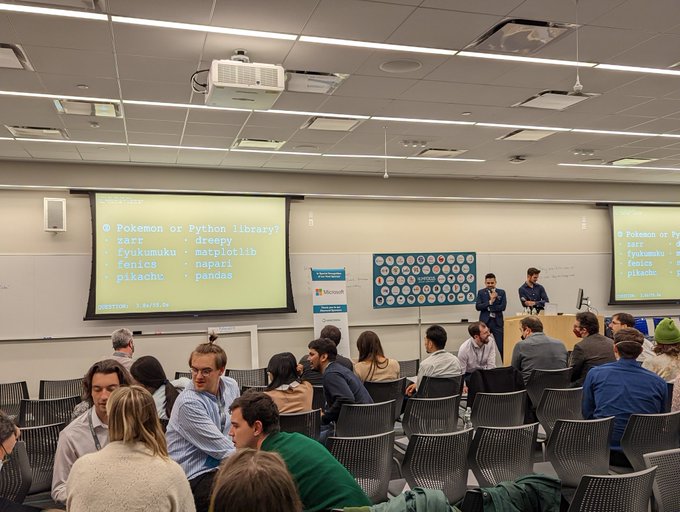
Day 2: Talks (Thursday, Nov 10th)
Day 2 started strong with our keynote Paul Romer, who gave a talk titled “Making Jupyter Ubiquitous and Making Billions from Crypto.” Unfortunately for some, there was no discussion of making billions from crypto, as that was a little extra click-bait for the title. However, I'm certain Paul’s thoughts on how Jupyter—and other technologies—can become more secure caused many of us to think more deeply about security in our online communities.
Immediately following Paul’s keynote, I hosted fireside chats along with Anna Vasilyeva. These were essentially an informal Q&A. I know that both Anna and I had a great time chatting with our keynote folks. Fireside chats enabled our audience to interact with each of our speakers in a semi-structured format. We had some fantastic discussion about each of our keynote sessions, and I wanted to thank all of our conference attendees who made this event such a success!
Following the fireside chats, Melissa Mendonça gave the final keynote talk of the conference, entitled “Can we Optimize Communities?” Melissa shared some great remarks on how the PyData community has come together to grow, especially around the large projects she works on. While there is still room to move in the right direction, Melissa is working to ensure that our community puts on a big welcome in order to get more members involved in open source contributions. I enjoyed Melissa’s keynote as I remember how nervous I was the first time I submitted a PR (knowing next to nothing about git, I was certain I had done something wrong), and if it wasn’t for supportive communities like those that Melissa is helping to foster, I might never become a contributor myself.
As soon as these ended, I was thrown into the deep end with Thomas Caswell and forced to try my hand against his in a CodeDuel. This amazingly fun game, created by two PyData NYC 2022 Diversity Scholars, has two players go head-to-head to see who can solve a LeetCode-style problem faster. Thomas and I faced off valiantly for ~7 minutes before Thomas emerged the winner. While I wasn't able to take home the trophy, I can say that I thoroughly enjoyed trying.
Straight from the CodeDuel, we ended our second day with lightning talks! These 5-minute talks were on a sign-up only basis that proved to be a whirlwind of fun. We had so many talented individuals sharing their hobbies, projects, work, and passions, and the 5-minute format kept the pressure on. The audience was always supportive for any hiccups along the way, especially when I was unable to get my talk working the first time I approached the podium. Thankfully, after a few more minutes of technical difficulties, I was able to share the lightning talk that I had thrown together the night before: “Matplotlib: Not Just a Plotting Tool.”
The talk itself was designed to be a fun demonstration of all the things you can do once you understand more than just the convenient matplotlib.pyplot interface. I took this one step further by designing the entire talk to run in a matplotlib Figure window, linking animations to button presses to mimic a slideshow-like presentation. The talk went well, and I was very happy to receive positive feedback from matplotlib’s core developer, conference keynote speaker, and CodeDuel champion, Thomas Caswell.
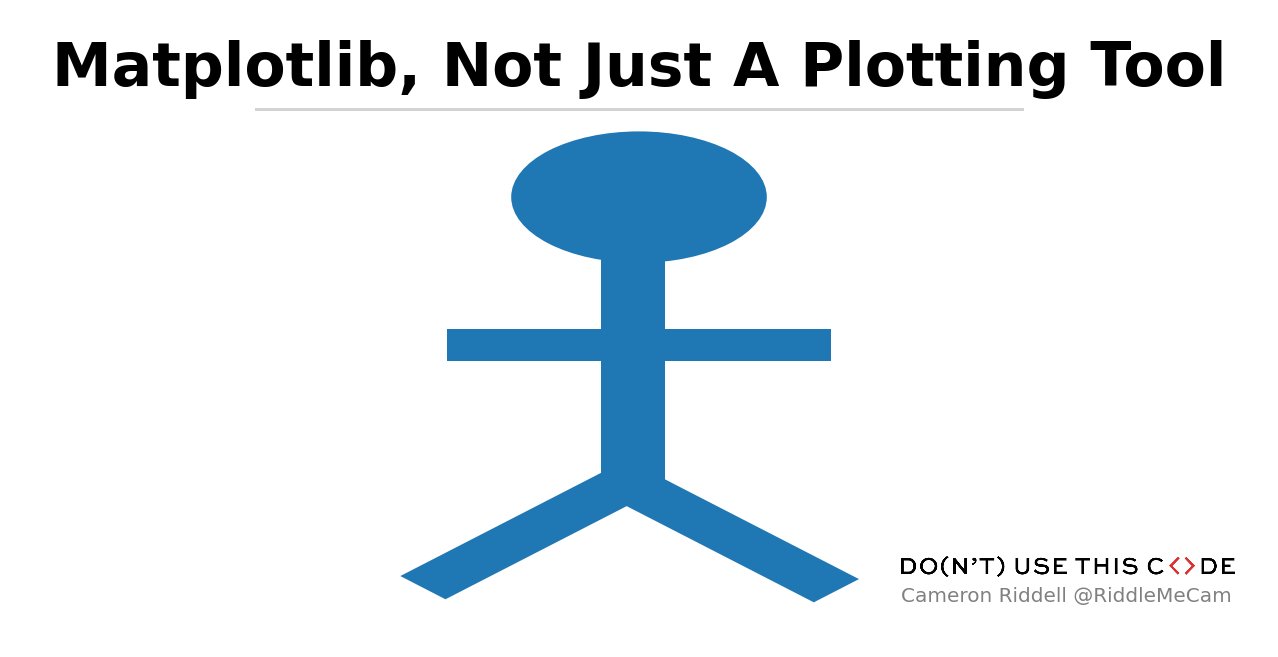
Day 3: Tutorials (Friday, Nov 11th)
The last day of the conference is always the saddest one. Thankfully, the tutorials were there to send us all off with one final hurrah as they walked new and seasoned users alike through their favorite tools. The tutorials carried the conference to the finish line on a fantastic note, and I would like to thank all of our speakers who shared their demonstrations and all of our enthusiastic conference attendees who showed up ready to learn!
Summary
What a great week! At a PyData Conference, you can expect to find great talks, tutorials, networking opportunities, and most importantly, a sense of community. As this was my first in-person Python conference, I wasn’t entirely sure what to expect and was amazed how the organizers & volunteers came together to make it such a special event.
If you've not yet been to any PyData events, I can assure you that they are worth checking out!